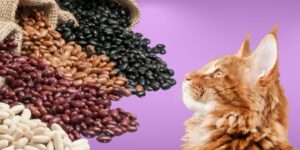Cats are obligate carnivores, which means that they have a biological need for animal protein in their diet. As a result, cats cannot thrive on a plant-based diet, and they should not eat black beans or any other type of bean. Instead, feed your cat a high-quality commercial cat food, specifically formulated to meet their nutritional needs to ensure their overall health.
Introduction
The importance of a proper diet for cats
Proper nutrition is essential for your cat's health and well-being. A balanced and species-appropriate diet provides the necessary nutrients to support their growth, maintain a healthy weight, and prevent various health issues.
Obligate carnivores and their nutritional needs
Cats are obligate carnivores, which means they require a diet that is high in animal protein. This is because they have evolved to primarily eat prey animals and need specific nutrients, such as taurine, which can only be found in animal-based sources.
The nutritional content of black beans
Protein content in black beans
Black beans are high in plant-based protein, an essential nutrient required for growth and tissue repair. However, this type of protein is not suitable for cats, as they are unable to break down and utilize it efficiently.
Carbohydrates in black beans
Black beans are also high in carbohydrates, which are not a necessary part of a cat's diet. Excessive carbohydrate intake can lead to various health problems, such as obesity and diabetes.
Fiber and other nutrients in black beans
Black beans contain a significant amount of fiber and other nutrients, like vitamins and minerals. While these nutrients may be beneficial for humans, they are not readily available for cats and can cause digestive issues if consumed in large quantities.
Why black beans are not an ideal food source for cats
Inability to digest plant-based proteins
Cats lack the necessary enzymes to break down plant-based proteins efficiently. Feeding your cat a diet that relies on plant-based protein sources, such as black beans, can lead to nutrient deficiencies and related health problems.
High carbohydrate content and potential health problems
The high carbohydrate content of black beans can contribute to weight gain, obesity, diabetes, and other health issues in cats.
Digestive issues caused by beans
Gastrointestinal distress
Consuming beans, including black beans, can cause gastrointestinal distress in cats. This often results in vomiting and diarrhea.
Gas and bloating
Beans are known to cause gas and bloating, which can be uncomfortable for your cat and contribute to poor digestion.
Potential risks of feeding black beans to cats
Nutrient deficiencies
Feeding your cat black beans can lead to deficiencies in essential nutrients like taurine, which is vital for their heart and eye health.
Weight gain and obesity
The high carbohydrate content in black beans can contribute to weight gain and obesity. Obesity can cause various health issues, such as diabetes, heart disease, and joint problems.
Diabetes
A high carbohydrate diet increases the risk of developing diabetes in cats. This chronic disease requires lifelong monitoring and treatment.
Kidney problems
A diet high in carbohydrates and low in animal protein can ultimately lead to kidney problems in cats.
Alternative protein sources for cats
High-quality commercial cat food
Wet cat food
Wet cat food contains more moisture than dry food and also satisfies your cat's need for animal-based protein.
Dry cat food
Dry cat food has a longer shelf life and can be more convenient for feeding, but make sure it is high in animal protein and low in carbohydrates.
Raw or cooked meats
Chicken
Beef
Fish
Turkey
Feeding your cat raw or cooked meats such as chicken, beef, fish, and turkey is an excellent way to provide them with the necessary animal protein.
Safe and healthy treats for cats
Freeze-dried meat treats
Freeze-dried meat treats are a healthier alternative, retaining their nutrients and flavor.
Commercial cat treats
Look for treats that are specifically designed for cats and contain animal protein as the primary ingredient.
Tips for maintaining a healthy diet for your cat
Proper portion control
Make sure you're feeding your cat the right amount of food by following the guidelines on the cat food packaging or consulting with your veterinarian.
Monitoring your cat's weight and overall health
Regularly weigh your cat and look for signs of health issues, such as changes in appetite or activity level, and consult your vet if you notice any issues.
Consulting with a veterinarian for personalized advice
Always consult with your veterinarian if you have any concerns about your cat's diet or health.
Frequently Asked Questions
Can cats eat other types of beans?
Cats should not eat any type of beans, due to their inability to digest plant-based proteins and the high carbohydrate content.
What human foods are safe for cats to eat?
Some safe human foods for cats include plain cooked meats, such as chicken or turkey, without any added flavors or seasoning.
Can cats be vegetarian or vegan?
No, cats are obligate carnivores and require animal protein in their diet.
Conclusion
It is crucial to provide a species-appropriate diet for cats to ensure their overall health and well-being. Avoid feeding black beans and other types of beans to your cat, as they can cause potential risks and health problems. Stick to high-quality commercial cat food or cooked meats and always consult your veterinarian for personalized advice on your cat's nutrition.



